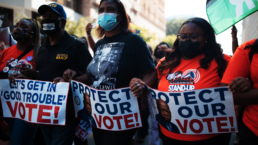By upholding Alabama’s gerrymandered districts, SCOTUS is laying the groundwork for ending voting rights and political power for Black people.
By April England-Albright, Cliff Albright & LaTosha Brown, The Guardian
In Tuesday, the US supreme court in its Merrill v Milligan decision, upheld Alabama’s racially gerrymandered congressional map, which see Black people represented in only 14% of congressional districts, despite making up about 27% of Alabama’s population. This ruling is reminiscent of the holding in the supreme court’s 1857 Dred Scott decision that Black people “had no rights which the white man was bound to respect”. Even though the two cases addressed two different situations, the overall disregard of the rights of Black people in America by the highest court in the country is the same.
And just as the Dred Scott decision laid the groundwork for similar rulings that led to the continuation of white political power at the expense of Black political power, so too does the Miller case lay the groundwork for ending voting rights and political power for Black people in this country and a path towards white political power at all levels of government.

Some reading this will gasp and accuse us of misusing an explosive pre-reconstruction case to make a racially charged argument. But the reality is that the conservative gang of justices, under the leadership of Chief Justice John Roberts, had already joined its pre-1954 brethren who had indoctrinated Jim Crow policies and the disenfranchisement of Black voters.
Recent Posts
“Arrest Now, Ask Questions Later”: Why Did L.A. ICE Agents Arrest and Jail U.S. Citizen Andrea Velez?
July 3, 2025
Take Action Now “They didn’t have vests that said ICE or anything. Their cars didn’t have license plates. … Just because of the color of our…
Trump’s Big, Beautiful Bill Is Naked Class War
July 3, 2025
Take Action Now Trump’s “Big, Beautiful Bill” trades tax cuts on millionaires for the dissolution of society.By Hamilton Nolan, In These Times…
Mayor Mamdani’s First Day, A Zero Hour Conversation With Richard Wolff
July 2, 2025
Take Action Now If elected, what would Mayor Mamdani do on his first day in City Hall? How would a democratic socialist govern as a big-city mayor?……
The U.S. Is Funding A Bloodbath At Gaza Aid Centers
July 2, 2025
Take Action Now The admin just gave $30M to GHF, the organization at the center of charges that Israel is weaponizing assistance and shooting at…




